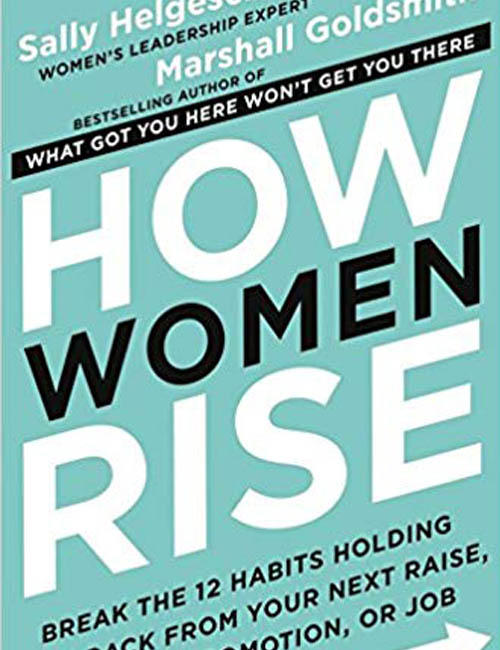Reviewed by Susan Fader, susanfader@faderfocus.com
Fader & Associates, Teaneck, NJ
The “confidence gap”—where women underestimate their abilities, think they are less skilled, and believe they are less able to do something than a man of similar qualifications and experience; and men overestimate their actual competence and abilities—seems as entrenched as ever. To help women break the “confidence gap” and 11 other self-limiting habits, Sally Helgesen and Marshall Goldsmith have written How Women Rise: Break the 12 Habits Holding You Back from Your Next Raise, Promotion, or Job.
And if you were thinking, “Come on now, it’s the 21st century, is this confidence gap really still an issue?”, a recent Twitter post provides an emphatic yes. In her post, Monica Hesse, a Washington Post reporter and columnist, addresses the issue of why the men are quoted at significantly higher rates than women:
“A few colleagues and I did a lighthearted story where we called up lots of famous people and asked about their favorite movies about their professions. So, what does the head of NASA think is the best movie about astronauts? What does Cal Ripken, Jr. think is the best movie about baseball? (Poignantly, I interviewed Anthony Bourdain about his favorite movie about cooking). In the end, we had 25 movies, but only seven female voices. Some readers were annoyed, and rightfully so. What they didn’t know is that I was annoyed, too. I had called dozens of women. I had called a ratio of three women to every one man. The women kept saying “I’m not funny enough” or “I’m not a big enough expert” or “Try this colleague instead.” The men all thought they were big enough experts. They were more than happy to talk.”
So, sometimes what we see is a failure of journalism. But sometimes it’s a deeper societal problem that has to do with confidence, and overconfidence, and with women feeling safe speaking up, and with women believing they should be taken seriously because they have, in fact, been taken seriously.
In How Women Rise, the authors draw on their different experiences and perspectives to write this book. Sally Helgesen is a women’s leadership expert, and Marshall Goldsmith is an executive coach who wrote What Got You Here, his original book on habits that sabotage people’s careers. Goldsmith had originally thought the habits he highlighted in What Got You Here are equally applicable to men and women, but through his subsequent executive coaching of senior male and female executives, he realized that while some of the habits are gender neutral, many of the habits he had outlined in What Got You Here are more reflective of how men behave. He recognized that some key hindering habits that he had not identified in What Got You Here are key stumbling blocks for women.
As the title implies, How Women Rise: Break the 12 Habits Holding You Back from Your Next Raise, Promotion, or Job focuses on the 12 habits that the authors feel women have that can sabotage their careers and working environments, e.g., Reluctance to Claim Your Achievements; Overvaluing Expertise: Building Rather than Leveraging Relationships; The Disease to Please; Putting Your Job Before Your Career; Minimizing; and, The Perfection Trap.
What makes this book extremely helpful are the many relatable examples where women were not even aware that a behavior or habit was hindering their career, and, more importantly, the concrete steps that women can take so they are not sabotaging the potential to advance in their careers. Or just plain and simple: by changing these habits they can make their day-to-day work life easier and more enjoyable.
This is a powerful guide and very interesting book that is easily read cover to cover, and while one may feel that a number of these twelve habits may apply, the authors wisely recommend that it would be much more effective to identify and focus on no more than three key habits that one wishes to change.
This book is targeted to women, but men also could benefit from reading and absorbing its lessons in order to diminish the men are from Mars, women are from Venus situations that happen in the workplace.


Be the first to comment